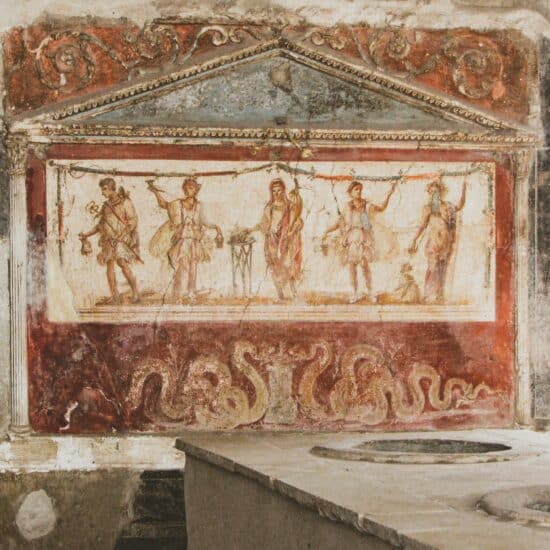 Buried With Christ
Buried With Christ
Formations: March 10, 2019
Scripture: Romans 6:1-14

Michael K Olmsted
Over the next four Sundays we will be studying parts of the Apostle Paul’s most comprehensive theological treatise, his letter to the church at Rome. So far as we know, Paul never visited the church at Rome, but his letter was so profound that it was circulated among all the churches. Who better to compose such a broad summation of the Christian faith than a Pharisee who was meticulously schooled in the history, practices and theology of Judaism? Paul, who formerly lived by God’s promises to Israel, now lived in the truth that God’s love had become real and available to all humankind through Jesus the Christ. At the end of Romans 5:20 Paul rejoices that “where sin increased, grace abounded all the more.” Was Paul reflecting on the tragic history of Israel, that always seemed to walk away from God’s persistent love? Was he hinting that our increasing sins would draw out more of God’s grace (6:1)? “No!” says Paul, “By no means! How can we who died to sin go on living in it?” (v. 2).
Nowhere in Scripture do we find the idea that God’s love, forgiveness and grace are detached from our motives, thinking or actions. The term “holiness” in these lessons includes intention and daily living.
Paul was writing to a congregation composed of Jews who had backed away from the idea of legalism and sacrifices to satisfy God, plus Gentiles who came from a world where religion had nothing to do with morality or values. Believing in Christ and living by his words and example are the heart of Christianity.
Paul uses the dramatic visual image of baptism in water, being buried and then raised up to an entirely new life in Christ. In those days baptism was reserved for adults who would fully understand its meaning and the seriousness of living a different life based on faith in God: “just as Christ was raised from the dead by the glory of the Father, so we too might walk in the newness of life” (v. 4). Our testimony is that only through Christ’s death and resurrection can we become a child of God: “For if we have been united with him in a death like his, we will certainly be united with him in a resurrection like his” (v. 5). The word united in the Greek carries the image of two trees growing so closely together that their trunks are intertwined inseparably.
The faith commitment pictured by Paul is a visibly different life, marked by love, integrity and a desire to share God’s love with the world around us. We are called to see ourselves in a new way, not as people trapped in the darkness of a broken world, but as a people who are dead to the condemnation of sin and alive to God through Jesus Christ (v. 11). Paul’s language may seem repetitious, but the idea that we are without hope as either Jew or Gentile without Christ’s death and resurrection conflicts with our ideas of moral indifference and selfishness.
How do you see yourself? This is not a scathing evangelistic sermon that details your every sin and evil thought resulting in the flames if eternal damnation. This is a message of hope and joy, the promise that God in Christ loves you so much that he invites you to love him back and live in the strength of his grace. Paul describes that life of faith. “Do not let sin exercise dominion in your mortal bodies, to make you obey their passions … no longer present your members to sin as instruments of wickedness, but present yourselves to God as those who have been brought from death to life, and present your members to God as instruments of righteousness” (v. 13).
Here, Paul is answering his earlier stimulating question, “shall we continue in sin?” (v. 1). If you are truly a new creation through God’s grace you cannot live in disregard of morality and love because that would mean sin dominates you (v. 14)!
The key to this teaching about living a “holy” life is that you are “not under law but under grace” (v. 14). The grace of God frees and empowers you to a decent and compassionate life, built on the example of Jesus. Paul declares that “sin will have no dominion over you” (v. 14). We use phrases like “dying to self,” “living the resurrected life,” and “serving Christ.” The Greek word for “dominion” is clearly related to the word for “lord,” as in what dominates or shapes your life. We are not perfect or immune to failure, but we are capable of growing more and more like our Savior as God’s grace works within us. Paul is writing about the “Christ life” that reflects love, kindness, decency, unselfishness and integrity.
This high theology always comes down to practical living. Paul never suggests that we will be perfect, while constantly pointing us to Jesus as our ultimate example. But there is another vital element in this Christ life: Christ has replaced our fear and imperfections with his companionship in our daily challenges. Paul often writes about the faithful and powerful presence of the Holy Spirit in a Christian’s life, as in Romans 8:14: “For all who are being led by the Spirit of God, these are the (children) of God.” The question we must ask ourselves over and over is, “How am I different from the thinking of this world in my values, relationships and actions?”
This is the church season called Lent. Comparable to a secular New Year’s Eve when resolutions are made and quickly forgotten, Lent invites us to not only look within, but to seek God’s help with our spiritual needs and life pattern. This is an opportunity to revisit Paul’s baptism metaphor, to recognize that in God’s love and gift of new life we can continue to grow, confront our past failures and seek new opportunities to share God’s love and make a difference. Study passages like Jesus’ Sermon on the Mount (Matthew 5-7) and his promises to his followers (John 14:1-20). We are not under law but grace. Every day is new with God’s presence and promises; you have been buried with Christ and now you have risen to a new life of grace.
Formations is a curriculum series from Smyth & Helwys Publishing, Inc. through NextSunday Resources.
The PDF download requires the free Acrobat Reader program. It can be downloaded and installed at https://get.adobe.com/reader (uncheck optional offers first).



